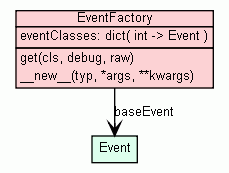
| Home | Trees | Indices | Help |
|
|---|
|
|

Factory of Event objects.
|
|||
| Event |
baseEvent Base class for Event objects. |
||
|
|||
|
Inherited from |
|||
|
|||
| Event |
|
||
|
|||
| EventFactory |
|
||
|
|||
| dict( int → Event ) |
eventClasses = Dictionary that maps event codes to Event subclasses. |
||
|
|||
|
Inherited from |
|||
|
|||
|
|
|
|||
eventClassesDictionary that maps event codes to Event subclasses.
|
| Home | Trees | Indices | Help |
|
|---|
| Generated by Epydoc 3.0.1 on Fri Feb 12 19:46:19 2010 | http://epydoc.sourceforge.net |